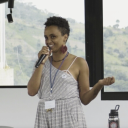In our continuous endeavour to strengthen civil society and promote inclusion across all spheres, the Encuentro Iberoamericano de la Sociedad Civil (CEMEFI) became a hub of convergence and collaboration, with Kubadili playing a pivotal role as a co-creator.
For CEMEFI, collaboration and inclusion weren’t merely goals to achieve, but intrinsic values that permeated every aspect of the event. From format selection to activity execution, prioritising the diverse perspectives and equitable participation of everyone involved was paramount.
Why are formats like fishbowl discussions, lightning talks, and interactive murals inclusive? This question is crucial in understanding how a variety of formats contributes to fostering an environment of inclusion and active engagement.
1. Fishbowl Discussions: A Space for Diverse Voices
The interactive fishbowl format, with its open and participatory nature, allows multiple voices to be heard. By providing an opportunity to share ideas and experiences in an informal and welcoming environment, inclusion of individuals with varying levels of expertise and knowledge is fostered. Those who may not feel comfortable speaking on a stage have the chance to contribute meaningfully in a more intimate and collaborative setting.
2. Lightning Talks: Amplifying a Diversity of Perspectives
Lightning talks provide a platform for a wide range of voices to share their stories and ideas in a short period. This dynamic and accessible format enables individuals with diverse communication skills to express themselves and be heard. Additionally, by limiting the time for each presentation, multiple perspectives are ensured representation, enriching dialogue and mutual understanding.
3. Interactive Murals: Building Connections and Synergies
Interactive murals serve as visual spaces where participants can contribute ideas, reflections, and proposals in a non-verbal manner. This inclusive format allows individuals with different learning styles and forms of expression to actively engage in the conversation. By visualising everyone’s ideas in a tangible and accessible format, collaboration is promoted, and meaningful connections are built among participants.
The value of these formats lies in their ability to democratise the exchange of ideas and promote equitable participation for all involved. By offering inclusive spaces that embrace a wide range of communication styles and forms of expression, these formats not only enrich dialogue but also strengthen community bonds and foster a sense of belonging. By integrating format diversity into events like the Encuentro Iberoamericano de la Sociedad Civil, a stage is set where collaboration and innovation can flourish, paving the way for meaningful and sustainable change in our society.
Ann Hilary Lewis Monge is an Organisational Transformation Catalyst at Desarrollo Institucional, Mexico.






Comments (0)